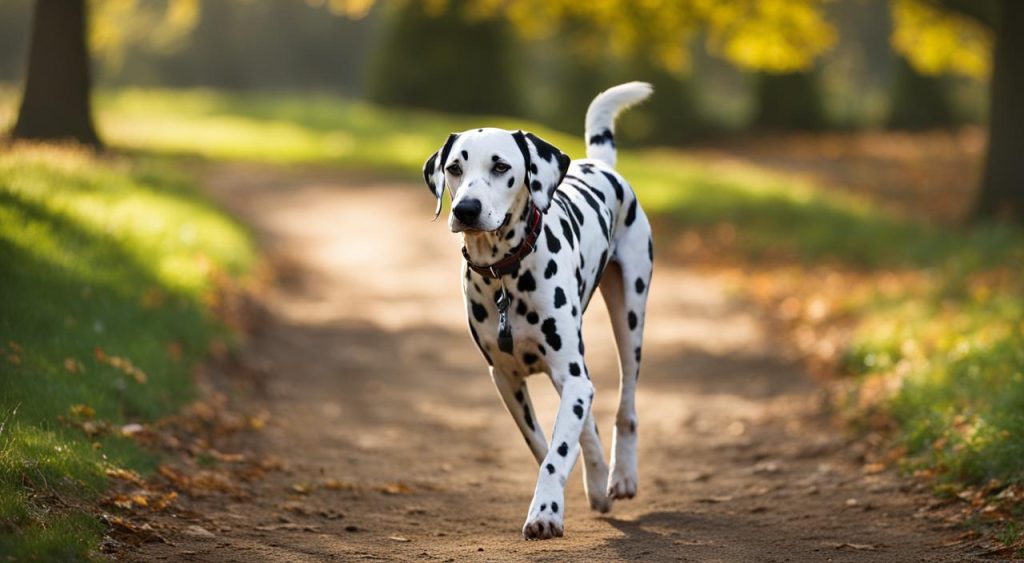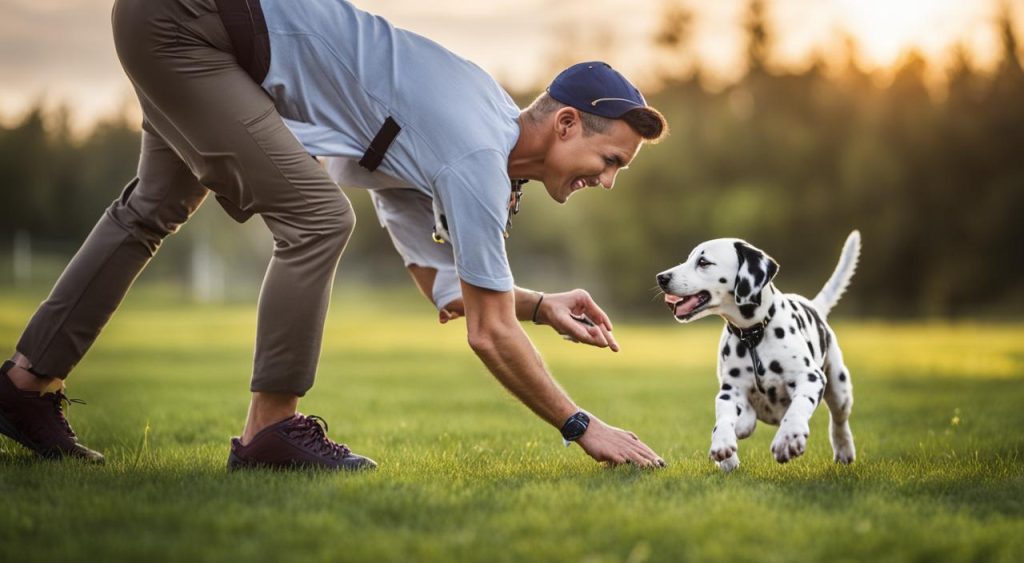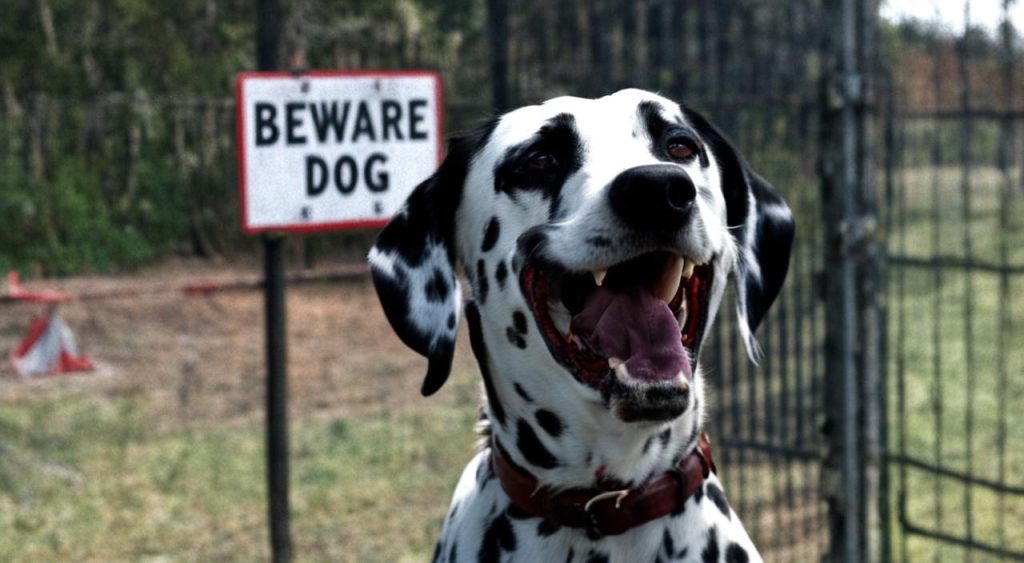If you’re considering adding a Dalmatian to your family, it’s important to understand that they require a significant amount of care and attention. Dalmatians have unique needs and characteristics that make them high maintenance. From grooming and exercise to training and health concerns, being a Dalmatian owner comes with a set of responsibilities.
Key Takeaways:
- Dalmatians require regular grooming to keep their coat clean and healthy.
- They have high energy levels and need at least 1-2 hours of vigorous exercise daily.
- Dalmatians have a confident, energetic temperament and require consistent training.
- They are prone to breed-specific health concerns such as hereditary deafness and urinary tract issues.
- Dalmatian owners must be committed to meeting their high maintenance requirements.
Dalmatian’s Physical Description and Coat
Dalmatians are known for their distinctive physical appearance, characterized by their white coat and black or brown spots. Their coat is short, dense, and sleek, which gives them a unique and eye-catching look. The spots on a Dalmatian can vary in size and shape, making each dog’s coat pattern truly one-of-a-kind.
The Dalmatian coat is not only visually appealing but also serves a purpose. According to experts, the spots on their coat may have evolved to provide camouflage in certain environments, such as the forests and grasslands where they originated.
In terms of size, Dalmatians are considered a medium-sized breed. They typically have an average height ranging from 19 to 24 inches at the shoulder, and their weight typically falls between 45 and 70 pounds. However, it’s important to note that individual Dalmatians may vary slightly in size based on factors such as genetics and overall health.
Whether admired for their striking coat or their distinctive size, Dalmatians are undeniably captivating dogs that stand out wherever they go.
Dalmatian Temperament and Personality
Dalmatians have a confident, energetic, and watchful temperament. They possess a natural curiosity and intelligence that makes them highly trainable and responsive to commands. However, it’s important to approach their training with gentleness and consistency to ensure they develop good behavior.
These dogs are known for their outgoing and friendly nature towards their family members. They form strong bonds with their humans and enjoy being a part of the family activities. Over time, Dalmatians can also warm up to strangers and become more approachable.
One of the standout traits of Dalmatians is their protective nature. They are highly devoted to their family members and will go to great lengths to keep them safe. This quality makes them excellent guard dogs, as they have a keen sense of awareness and will alert their owners to any potential threats.
When it comes to their behavior, Dalmatians thrive on mental and physical stimulation. They require regular exercise and activities that challenge their energy levels to prevent boredom and destructive behaviors. Providing them with ample opportunities for play and exercise will keep them happy and well-balanced.
“Dalmatians are confident, energetic, and protective dogs. They are intelligent and thrive on mental and physical stimulation. With proper training and exercise, they make excellent family pets and guard dogs.”
Dalmatian Exercise Needs
Dalmatians are known for their high energy levels and need for regular exercise to maintain their physical and mental well-being. These energetic dogs require at least 1-2 hours of vigorous exercise and playtime each day to prevent boredom and destructive behaviors.
“Dalmatians are bursting with energy, and they thrive when given plenty of opportunities to release it through exercise.”
Due to their high endurance level, Dalmatians are well-suited for various activities that challenge their athleticism. Running, hiking, and participating in dog sports like agility or flyball are excellent ways to keep them active and engaged.
Dalmatians have a moderate activity distance rating, which means they can handle longer distances during exercise. This makes them great companions for outdoor activities and adventures.
To provide adequate exercise for your Dalmatian, consider incorporating a mix of physical and mental stimulation. Engaging them in interactive games, puzzle toys, and obedience training can help channel their energy in constructive ways.
Remember to adjust the exercise regimen based on your Dalmatian’s age, health, and individual needs. Always consult with your veterinarian to determine the right balance of exercise for your furry friend.
Dalmatian Grooming Requirements
Proper grooming is an important aspect of Dalmatian care. While their coats are generally low-maintenance, regular grooming is necessary to keep them clean and healthy.
Dalmatians are heavy shedders, and their shedding can be more pronounced during certain seasons. Daily brushing can help minimize shedding and remove loose hair, keeping your home clean and your Dalmatian’s coat looking its best.
In addition to brushing, regular ear cleaning is essential for Dalmatians. Their ears are prone to wax build-up and infections, so it’s important to check and clean their ears on a weekly basis. Use a vet-recommended ear cleaner and gently wipe the outer part of the ear with a clean cloth or cotton ball.
Trimming your Dalmatian’s nails is another important grooming task. Overgrown nails can be uncomfortable and even cause pain, so regular clipping or filing is necessary. If you’re unsure how to properly trim your Dalmatian’s nails, consult a professional groomer or your veterinarian for guidance.
Remember, a well-groomed Dalmatian not only looks good but also feels good. By taking care of their grooming needs, you’re ensuring their overall well-being and keeping them happy and healthy.
Dalmatian Health Concerns
Dalmatians are beloved and unique dogs, but they are prone to certain health issues that potential owners should be aware of. By understanding and addressing these health concerns, you can ensure that your Dalmatian lives a long, happy, and healthy life.
Hereditary Deafness
One of the most well-known health issues in Dalmatians is hereditary deafness. This condition affects approximately 8% of Dalmatians and can occur in one or both ears. It is thought to be a result of a gene variation that affects the development of the inner ear. Regular hearing tests can help to identify deafness in your Dalmatian, and if necessary, appropriate adjustments can be made to ensure their quality of life is not affected.
Urinary Tract Issues
Dalmatians have a unique urinary system that makes them prone to certain urinary tract issues. One common issue is the formation of bladder stones, which can cause discomfort and potentially block the urinary tract. It is important to provide your Dalmatian with a balanced diet and access to fresh water at all times to help prevent the formation of bladder stones. Regular veterinary check-ups are essential to monitor their urinary health and address any potential issues early on.
By proactive measures such as regular vet check-ups, proper care, and a balanced diet can help manage and prevent these health problems. Being attentive to these common health issues can help ensure your Dalmatian lives a happy, healthy life.
Dalmatian Training and Socialization
Training and socialization are essential aspects of caring for a Dalmatian. These intelligent dogs thrive when provided with positive and consistent training methods that help them develop good behavior and manners.
Early socialization is crucial for Dalmatians to ensure they get along well with other animals and people. By exposing them to various environments, sounds, smells, and situations from a young age, you can help them become well-adjusted and confident dogs.
Dalmatians are active and energetic, making them ideal candidates for activities like agility training and participating in dog sports. These activities not only provide mental stimulation but also allow them to channel their energy in a productive and enjoyable way.
“Training and socialization are key to raising a well-behaved and happy Dalmatian.”
When it comes to training Dalmatians, positive reinforcement methods work best. Reward-based training, using treats, praise, and play, helps to build a strong bond between you and your Dalmatian while motivating them to learn and respond to commands.
Obedience training is particularly important for Dalmatians due to their independent nature. Consistent and patient training will help them understand boundaries, follow commands, and become well-behaved members of the family.
Remember that training should be a continuous process throughout your Dalmatian’s life. Regular practice, reinforcement, and occasional refresher courses will ensure that they maintain their training and behavior skills.
By providing proper training and socialization, you can help your Dalmatian become a well-behaved and happy companion, enriching both your lives with a strong and positive bond.
Dalmatian Care and Owner Responsibilities
Owning a Dalmatian comes with a set of important responsibilities. As a Dalmatian owner, it is crucial that you are committed to providing the care and attention that this breed requires.
Dalmatian care:
Proper care of your Dalmatian involves several key aspects. This includes:
“Providing adequate exercise: Dalmatians are an energetic breed that requires plenty of physical activity. Regular exercise helps keep them happy and healthy.”
“Grooming: Dalmatians have a short coat that requires regular brushing to keep it clean and free from loose hair. Additionally, their ears should be checked and cleaned regularly to prevent infections.”
“Training: Dalmatians are intelligent dogs that benefit from consistent and positive training methods. Obedience training helps ensure that they are well-behaved and respond to commands.”
“Regular vet care: Dalmatians may be prone to certain health issues, so regular check-ups and preventative care are essential. Vaccinations, dental care, and parasite control should be included in their healthcare routine.”
Dalmatian responsibilities:
As a Dalmatian owner, you have specific responsibilities towards your furry friend. These include:
“Meeting exercise needs: Dalmatians thrive in households with active families who can provide them with enough exercise and mental stimulation. This includes daily walks, playtime, and opportunities to burn off their excess energy.”
“Ensuring proper socialization: Dalmatians need to be exposed to different environments, people, and animals from a young age to help them become well-adjusted and confident adults.”
“Providing mental stimulation: Dalmatians are intelligent dogs that require mental challenges to prevent boredom. Puzzle toys, interactive games, and training sessions can keep their minds sharp and engaged.”
“Creating a safe and secure environment: Dalmatians should have a securely fenced yard and be kept on a leash when outside of your property to prevent any accidents or escapes. They should also have a comfortable indoor space where they can rest and feel secure.”
By fulfilling these Dalmatian owner duties, you can ensure that your furry companion leads a happy and healthy life.
Dalmatian Living Conditions and Alone Time
Dalmatians are indoor dogs that thrive when they are part of the family and have plenty of social interaction. They are highly sociable and enjoy being around their human companions. Being an active and energetic breed, Dalmatians require a securely fenced yard where they can run and play. Regular outdoor exercise is essential to fulfill their exercise needs and keep them physically and mentally stimulated.
However, it is important to note that Dalmatians should primarily be indoor companions. They are highly social dogs and can become anxious or develop behavioral issues if left alone for extended periods of time. They crave attention and thrive when they are included in family activities.
It is recommended that Dalmatians have access to both indoor and outdoor spaces. Indoors, they should have comfortable bedding and a designated area where they feel safe and secure. Outdoors, a securely fenced yard provides a safe environment for them to explore and play. This combination of indoor and outdoor spaces ensures that Dalmatians have the opportunity for both exercise and social interaction.
While Dalmatians do require alone time, it should be kept to reasonable durations. Leaving them alone for too long can lead to separation anxiety and destructive behaviors. If you need to be away for an extended period, it is advisable to enlist the help of a pet sitter or consider doggy daycare to provide companionship and stimulation for your Dalmatian.
Creating a balance between indoor comfort, outdoor exercise, and quality time with their family will help Dalmatians thrive and lead happy, fulfilled lives.
Dalmatian and Children
Dalmatians can be wonderful companions for older children, providing them with a loyal and playful four-legged friend. However, it’s important to consider the breed’s high energy levels and exuberance when it comes to younger children.
Dalmatians are known for their boundless energy and enthusiasm, which may not always be a good match for the sensitivity and fragility of younger children. They may unintentionally knock over or accidentally hurt a small child in their exuberance to play and explore. Therefore, it’s crucial to closely supervise interactions between Dalmatians and small children to prevent any accidents or mishaps.
Early socialization and training are key to ensuring that Dalmatians behave appropriately around children and understand their boundaries. Teach your children how to properly interact with the dog and establish rules that both the children and the dog should follow. This can include gentle play, no pulling on ears or tails, and giving the dog space when it needs it.
While Dalmatians can be family-friendly dogs, it’s essential to assess the individual temperament and behavior of each dog. Some Dalmatians may naturally have a more patient and gentle disposition that makes them well-suited for young children, while others may require more cautious handling. Consulting with a reputable breeder or professional dog trainer can help you select a Dalmatian that is a good fit for your family dynamics.
Remember: safety should always be a top priority when it comes to the interaction between Dalmatians and children. With proper training, socialization, and supervision, Dalmatians can become cherished playmates and lifelong companions for children.
Dalmatian and Other Pets
Dalmatians can be compatible with other pets if they are properly socialized from a young age. Their ability to get along with other animals largely depends on their early exposure and training.
When introducing a Dalmatian to unfamiliar dogs, it is important to proceed with caution. They may show aggression towards new canine companions, especially if they perceive them as a threat. It is recommended to introduce them slowly and in controlled environments to ensure a positive interaction.
“Proper socialization plays a vital role in Dalmatians’ compatibility with other animals. They can develop amicable relationships with dogs and cats if introduced and socialized appropriately.” – Dr. Sarah Johnson, Veterinarian.
Dalmatians have a natural affinity for horses and often establish a rapport with them easily. This compatibility can be attributed to their historical association with horses as carriage dogs. However, it is important to supervise their interactions to ensure the safety of both the Dalmatian and the horse.
When it comes to small animals such as rodents or birds, it is crucial to exercise caution and supervision during introductions. Due to their high prey drive, Dalmatians may view small animals as potential targets. It is best to keep them separated unless in controlled and supervised situations.
Remember, each Dalmatian’s temperament is unique, so compatibility with other pets may vary. Proper socialization, early exposure, and training can greatly increase the likelihood of a harmonious multi-pet household.
Dalmatian Cost of Ownership
Owning a Dalmatian can bring joy and companionship to your life, but it’s essential to consider the costs associated with their care. From veterinary expenses to grooming supplies, being prepared for the financial responsibilities of owning a Dalmatian is crucial.
Veterinary care is one of the most significant expenses when it comes to owning a Dalmatian. Regular check-ups, vaccinations, and preventive treatments for fleas, ticks, and heartworms are necessary to keep your furry friend healthy. Additionally, unexpected medical costs may arise, such as emergency visits or treatments for breed-specific health concerns like hereditary deafness.
It’s important to budget for veterinary care and have the financial means to provide the necessary medical attention for your Dalmatian.
In addition to veterinary expenses, grooming supplies and services should also be taken into account. Dalmatians have short coats, but they are heavy shedders. Regular brushing and grooming tools are needed to keep their coat healthy and to manage shedding. Professional grooming services may be required periodically to trim nails, clean ears, and maintain overall hygiene.
Proper nutrition is essential for the well-being of your Dalmatian. Quality dog food that meets their specific dietary needs is a recurring expense. Additionally, treats and supplements may be necessary to ensure their nutritional requirements are met.
“The overall cost of food will depend on the size, age, and activity level of your Dalmatian.”
Training is another aspect of ownership that may require financial investment. Dalmatians are intelligent dogs that benefit from obedience training and socialization. Enrolling them in training classes or hiring a professional dog trainer can help you establish good behavior and prevent behavioral issues down the line.
In summary, owning a Dalmatian involves various expenses, including veterinary care, grooming supplies, food, and potential training costs. It’s important to budget for these expenses and be prepared for the financial responsibility that comes with providing the best care for your Dalmatian throughout their lifespan.
Conclusion
In conclusion, Dalmatians are a high maintenance breed that requires dedicated care and attention. From regular grooming to ample exercise, training, and socialization, these unique dogs have specific needs that potential owners must consider. Before bringing a Dalmatian into your home, it is important to evaluate whether you are prepared to meet these requirements.
Proper care and responsible ownership are key to ensuring a fulfilling and rewarding relationship with a Dalmatian. By providing the necessary care and meeting their specific needs, you can enjoy the companionship of this beautiful breed. Remember that Dalmatians thrive in households with active families who can provide them with ample mental and physical stimulation.
Although Dalmatians can be a challenging breed, their intelligence, loyalty, and outgoing personality make them a wonderful addition to the right home. With the right commitment and dedication, you can forge a lifelong bond with your Dalmatian and create cherished memories together. Remember to budget for the various costs associated with owning a Dalmatian, including regular veterinary care and other expenses.



